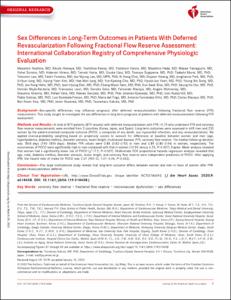KUMEL Repository
1. Journal Papers (연구논문)
1. School of Medicine (의과대학)
Dept. of Internal Medicine (내과학)
Sex Differences in Long-Term Outcomes in Patients With Deferred Revascularization Following Fractional Flow Reserve Assessment: International Collaboration Registry of Comprehensive Physiologic Evaluation
- Alternative Author(s)
- Cho, Yun Kyeong; Yoon, Hyuck Jun; Nam, Chang Wook; Hur, Seung Ho
- Journal Title
- Journal of the American Heart Association
- ISSN
- 2047-9980
- Issued Date
- 2020
- Abstract
- Background:
Sex-specific differences may influence prognosis after deferred revascularization following fractional flow reserve (FFR) measurement. This study sought to investigate the sex differences in long-term prognosis of patients with deferred revascularization following FFR assessment.
Methods and Results:
A total of 879 patients (879 vessels) with deferred revascularization with FFR >0.75 who underwent FFR and coronary flow reserve measurements were enrolled from 3 countries (Korea, Japan, and Spain). Long-term outcomes were assessed in 649 men and 230 women by the patient-oriented composite outcome (POCO, a composite of any death, any myocardial infarction, and any revascularization). We applied inverse-probability weighting based on propensity scores to account for differences at baseline between women and men (age, hyperlipidemia, diabetes mellitus, diameter stenosis, lesion length, multivessel disease, FFR, coronary flow reserve. The median follow-up duration was 1855 days (745-1855 days). Median FFR values were 0.88 (0.83-0.93) in men and 0.89 (0.85-0.94) in women, respectively. The occurrences of POCO were significantly high in men compared with that in women (10.5% versus 4.2%, P=0.007). Kaplan-Meier analysis revealed that women had a significantly lower risk of POCO (χ2=7.2, P=0.007). Multivariate COX proportional hazards regression analysis revealed that age, male, diabetes mellitus, diameter stenosis, lesion length, and coronary flow reserve were independent predictors of POCO. After applying IPW, the hazard ratio of males for POCO was 2.07 (95% CI, 1.07-4.04, P=0.032).
Conclusions:
This large multinational study reveals that long-term outcome differs between women and men in favor of women after FFR-guided revascularization deferral.
- Department
- Dept. of Internal Medicine (내과학)
- Publisher
- School of Medicine (의과대학)
- Citation
- Masahiro Hoshino et al. (2020). Sex Differences in Long-Term Outcomes in Patients With Deferred Revascularization Following Fractional Flow Reserve Assessment: International Collaboration Registry of Comprehensive Physiologic Evaluation. Journal of the American Heart Association, 9(4), e014458. doi: 10.1161/JAHA.119.014458
- Type
- Article
- ISSN
- 2047-9980
- Appears in Collections:
- 1. School of Medicine (의과대학) > Dept. of Internal Medicine (내과학)
- 파일 목록
-
-
Download
 oak-2020-0367.pdf
기타 데이터 / 621.92 kB / Adobe PDF
oak-2020-0367.pdf
기타 데이터 / 621.92 kB / Adobe PDF
-
Items in Repository are protected by copyright, with all rights reserved, unless otherwise indicated.